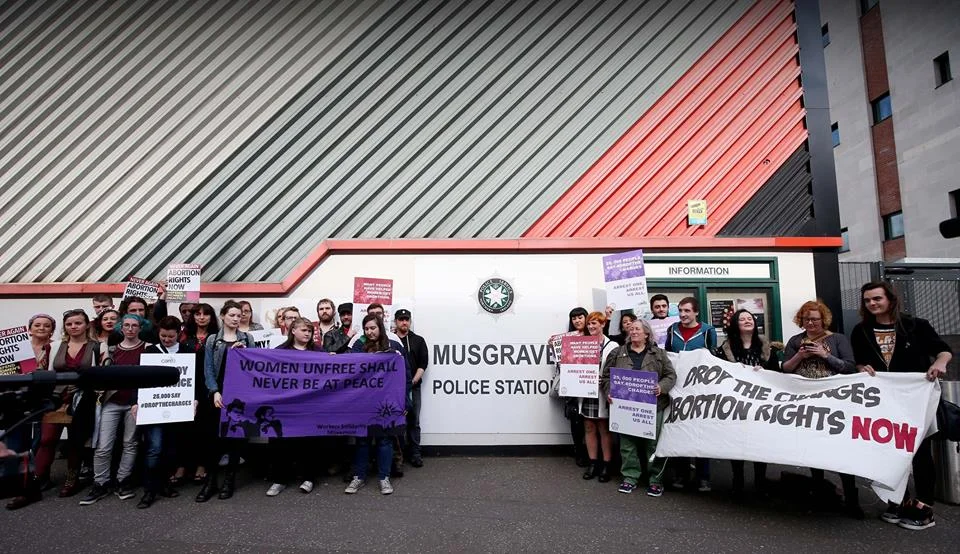Current law in Northern Ireland
The current law in Northern Ireland only allows for abortion in instances where the there is a risk to the life or long term or permanent risk to the mental or physical health of the pregnant person. Anyone who procures an abortion outside of these limited grounds, or helps someone to procure an abortion, is committing a criminal offence.
This offence is punishable by a sentence of up to life in prison under then 1861 Offences Against the Person Act[i]. In the past 2 years we have seen one woman given a suspended sentence, a man and a woman given a caution, and another woman charged with helping her teenage daughter obtain abortion pills online (this woman is currently taking a judicial review of the decision to prosecute her).
A limited number of legal abortions are performed in Northern Ireland, within the strict legal framework. However following the publication of draft guidelines[ii] in 2013 there has been a ‘chilling effect’ on medical practitioners. This has seen the number of legal NHS abortions a year fall from around 50, to just 16[iii] in 2015/2016. Meanwhile around 1000[iv] women a year travel to England for private abortion care and around 400 obtain safe but illegal pills from Women on Web. These numbers are estimates only and true figures cannot be known.
The most recent guidelines[v] published in 2016 acknowledge that many people are using illegal abortion pills obtained online. The guidelines seem to advocate a ‘don’t ask don’t tell’ approach to abortion pills in practice, while acknowledging that they are illegal to use to procure an abortion outside of the limited legal reasons outlined above.
The current law does not permit abortion in cases of fatal foetal anomaly, or where the pregnancy is a result of a sex crime (rape and/or incest). In 2015 that was found to be a breach[vi] of Article 8 of the European Convention on Human Rights. This ruling is currently under appeal by the Attorney General.
The current law in NI can only be interpreted by guidelines, it cannot be substantively changed. It would not be possible for even limited reform, to make NI compliant with minimum human rights standards, to be brought in by way of guidelines; there must be new legislation to extend abortion provision.
There is currently no referral pathway for people living in Northern Ireland who need an abortion, in spite of legal challenges[vii]. This means that they must travel and pay privately for a safe and legal abortion that would be available on the NHS elsewhere.
1967 Abortion Act
The 1967 Abortion Act[viii] currently applies in England Scotland and Wales. It allows for legal abortion up to 24 weeks for a range of reasons, provided that 2 doctors are satisfied that the conditions are met. The reasons include a risk to the life or health of the pregnant person or their existing children, where there is a risk of the foetus having a substantial disability, and socio-economic reasons. Abortion is legal after 24 weeks if two doctors agree that there is grave risk to the life of the pregnant person, a grave risk of mental or physical injury to the pregnant person, or if there is a severe foetal anomaly.
The 1967 act did not legalise abortions. Rather it provided a defence for doctors. Nor has it allowed for ‘abortion on demand’. Two doctors, acting in ‘good faith’, must agree that someone requesting an abortion meets the conditions outlined. Any abortions occurring outside of this legal framework is a criminal offence, punishable by a sentence of up to life imprisonment under the 1861 Offences Against the Person Act. On rare occasions people have been prosecuted in GB.
The 1967 Act is not fit for purpose; its requirements for the approval of 2 doctors is burdensome and prevents people from receiving timely care. There are ongoing campaigns[ix] to reform the 1967 Abortion Act, with a move towards decriminalisation as the preferred legal model.
John Larkin, Attorney General
Decriminalisation
Recently a Bill[x] was brought before the House of Commons to decriminalise abortion in England and Wales. This Bill’s progress was halted due to the snap Westminster Election. Decriminalisation has been introduced in countries including Canada and Australia[xi]. There is no evidence[xii] that decriminalisation increases the number of abortions
Decriminalisation does not mean deregulation. Coercion and abortion without consent could remain crimes. Medical practitioners could still operate under their own ethical guidelines. Decriminalisation would remove criminal sanctions for those seeking an abortion, making it a healthcare matter not a criminal justice one.
About the author:
Danielle Roberts received her LLB Law and Politics from QUB in 2007 and qualified as a solicitor in 2009. Danielle is currently completing a PhD on barriers to women's political participation. You can find her on twitter @DanirNI
[i] 1861 Offences Against the Person Act http://www.legislation.gov.uk/ukpga/Vict/24-25/100/crossheading/attempts-to-procure-abortion
[ii] Draft Termination of Pregnancy Guidance (2013) https://www.health-ni.gov.uk/sites/default/files/consultations/dhssps/termination-pregnancy-responses-2013.pdf
[iii] NI Termination of Pregnancy Statistics 2015/16 https://www.health-ni.gov.uk/news/ni-termination-pregnancy-statistics-201516
[iv] Abortion Statistics in England and Wales for 2015 https://www.gov.uk/government/statistics/report-on-abortion-statistics-in-england-and-wales-for-2015
[v]Guidance for HSC professionals on termination of pregnancy in Northern Ireland (2016)
https://www.health-ni.gov.uk/publications/guidance-hsc-professionals-termination-pregnancy-northern-ireland
[vi] Summary of Judgment http://www.courtsni.gov.uk/en-GB/Judicial%20Decisions/SummaryJudgments/Documents/Court%20declares%20abortion%20law%20in%20Northern%20Ireland%20breaches%20European%20Convention%20on%20Human%20Rights%20by%20faili/j_j_Summary%20of%20judgment%20-%20In%20Re%20NIHRC%20(Termination%20of%20Pregnancy)%2030.11.15.htm
[vii]R (on the application of A and B) (Appellants) v Secretary of State for Health (Respondent) https://www.supremecourt.uk/cases/uksc-2015-0220.html
[viii] Abortion Act 1967 http://www.legislation.gov.uk/ukpga/1967/87/contents
[ix] We Trust Women campaign http://www.wetrustwomen.org.uk/
[x] Reproductive Health (Access to Terminations) Proposed 13 March 2017 https://hansard.parliament.uk/commons/2017-03-13/debates/D76D740D-2DDD-4CCB-AC11-C0DBE3B7D0D8/ReproductiveHealth(AccessToTerminations)
[xi] World Abortion Laws map http://www.worldabortionlaws.com/
[xii] 5 reasons to decriminalise abortion http://www.wetrustwomen.org.uk/5-reasons-to-decriminalise-abortion/

